Follow Up Letter After Sales Call
Dear [Prospect's Name],
I hope this letter finds you well. I wanted to extend my gratitude for the opportunity to speak with you during our recent sales call. It was a pleasure discussing [product/service] and how it can benefit [Prospect's Company Name].
During our conversation, we delved into the specific challenges you mentioned, such as [highlight the challenges discussed]. I appreciated the insights you provided, and it allowed me to gain a deeper understanding of your needs and how our solution can address them effectively.
As promised, I am enclosing additional materials to support our discussion. Included is a detailed proposal that outlines the key features and benefits of our [product/service]. It also includes pricing options, implementation timelines, and any relevant terms and conditions. Please review it at your convenience, and don't hesitate to reach out if you have any questions or require further clarification.
Furthermore, I wanted to emphasize a few points that we discussed during our call:
1. [Reiterate the main benefits and value proposition of your product/service].
2. [Highlight any unique features or advantages your product/service offers].
3. [Address any specific concerns or objections raised during the call and provide additional information to alleviate them].
I genuinely believe that [product/service] can significantly contribute to the success of [Prospect's Company Name]. Our team is highly experienced in implementing similar solutions, and we are committed to ensuring a seamless and successful partnership if given the opportunity.
I understand that you may need some time to evaluate the proposal and discuss it internally. Please let me know if there's anything else I can provide to assist you in your decision-making process. I would be more than happy to arrange another call or meeting at a time that works best for you.
Thank you again for your time and consideration. I look forward to hearing from you soon.
Best regards,
[Your Name]
Formal Follow Up Email After Sales Call
Subject: Thank You for Your Time
Dear [Client’s Name],
I would like to sincerely thank you for taking the time to speak with me during our recent sales call. It was a pleasure learning more about your business needs and discussing how our solutions could help support your goals.
As discussed, I am attaching additional details about our products and pricing for your review. Please feel free to reach out with any questions, and I would be glad to provide further clarifications.
I look forward to hearing your thoughts and working together to take the next steps. Thank you once again for the opportunity to present our services.
Best regards,
[Your Name]
Casual Follow Up Message After Sales Call
Subject: Great Chat Yesterday!
Hi [Client’s Name],
It was really great talking to you yesterday! I enjoyed learning more about your business and the exciting things you have coming up. I think our solution could be a great fit for what you’re looking for.
Just wanted to drop you a quick note to say thanks for the time and to remind you that I’m here if you have any questions. No rush—take your time reviewing, and when you’re ready, we can set up the next steps.
Talk soon,
[Your Name]
Quick Follow Up Email With Proposal
Subject: Proposal Attached – Thank You for Your Time
Hello [Client’s Name],
Thank you once again for the sales call earlier today. As promised, I’ve attached the proposal for your review.
Please have a look when you get a chance. I’ll follow up with you later this week to see if you’d like to discuss further or make any adjustments.
Best,
[Your Name]
Follow Up Letter to Confirm Next Meeting
Subject: Confirmation of Our Next Discussion
Dear [Client’s Name],
Following our recent conversation, I would like to confirm our next meeting scheduled for [Date and Time]. During this session, we can go through the finer details of the proposal and address any outstanding questions.
I appreciate your time and consideration of our services, and I look forward to continuing the conversation to determine the best way forward.
Sincerely,
[Your Name]
Heartfelt Follow Up Email Emphasizing Relationship
Subject: Appreciated Our Conversation
Dear [Client’s Name],
I truly enjoyed our conversation yesterday and wanted to thank you personally for sharing your insights about your business. It was clear to me how passionate you are about your work, and I’d be honored if we had the chance to support you in your journey.
Please know that our team is committed not only to providing solutions but also to building long-term relationships with our clients. I would love to stay connected and continue exploring how we can add value to your operations.
Warm regards,
[Your Name]
Follow Up Email After Sales Call Without Response
Subject: Checking In After Our Call
Hi [Client’s Name],
I hope this message finds you well. I wanted to follow up on our recent sales call and see if you had any questions about the proposal I shared. I completely understand that things can get busy, so I just wanted to check in at your convenience.
If now isn’t the right time, no worries—please let me know when would be better for you, and I’d be happy to reconnect then.
Thank you again for considering us.
Best,
[Your Name]
Professional Follow Up Email With Additional Resources
Subject: Additional Information Following Our Call
Dear [Client’s Name],
Thank you for the opportunity to speak with you during our sales call. As promised, I’ve attached some additional resources, including case studies and testimonials, that highlight how our solutions have supported businesses similar to yours.
I believe these examples may give you a clearer picture of how we can deliver measurable results for your organization. Please review them at your convenience, and I would be glad to discuss any questions in more detail.
Looking forward to your feedback.
Best regards,
[Your Name]
Why do you need a follow up letter after a sales call
A follow up letter after a sales call is crucial because it:
- Reinforces the key points discussed during the call.
- Shows professionalism and commitment to the client’s needs.
- Keeps the communication channel open and active.
- Helps build trust and a lasting relationship.
- Encourages the client to take the next step, whether it’s reviewing a proposal, asking questions, or scheduling another meeting.
Without a follow up, potential clients may lose interest or forget about the conversation.
Who should send a follow up letter after sales call
- Sales representatives directly responsible for the client.
- Account managers nurturing existing clients.
- Business owners in smaller companies handling client relationships.
- Customer success or support staff when technical clarification is needed.
The sender should always be the person who had the original conversation, ensuring consistency and personal connection.
When should you send a follow up letter after a sales call
- Immediately after the call (within 24 hours) to keep the discussion fresh.
- When sharing proposals, contracts, or additional resources promised during the call.
- After a period of no response to gently remind the client.
- Before a scheduled follow up meeting as a confirmation.
- After the client has expressed interest but needs more time to decide.
Timeliness is key to maintaining momentum and demonstrating attentiveness.
How to write and send an effective follow up letter
- Start with a polite thank you for the client’s time.
- Recap important points from the call to show attentiveness.
- Provide promised information (proposal, resources, documents).
- Clearly outline next steps or suggested actions.
- Keep the tone consistent with the client’s communication style.
- Send it via the client’s preferred channel (email, formal letter, or business portal).
- Proofread carefully to maintain professionalism.
Formatting and tone of follow up letters
- Length: One to three short paragraphs.
- Tone: Adapt to client—formal for corporate, casual for startups, friendly for long-term relationships.
- Style: Clear, direct, and professional.
- Mode of Sending: Email is most common, but a printed letter may be used for formal industries.
- Etiquette: Always personalize with the client’s name and reference details from the call.
- Closing: End with a call to action or invitation for next steps.
Common mistakes to avoid in follow up letters
- Sending the letter too late, losing the momentum of the conversation.
- Using generic templates without personalization.
- Overwhelming the client with too much information.
- Being too pushy or aggressive in tone.
- Forgetting to include promised documents or attachments.
- Failing to provide a clear next step or action point.
Tricks and tips for writing powerful follow up letters
- Use the subject line strategically to grab attention.
- Add value by including relevant resources, insights, or case studies.
- Keep it concise but impactful.
- Match the client’s communication style for better connection.
- Use reminders tactfully if following up after no response.
- Always end with gratitude and an open door for further discussion.
After sending: what follow up is needed after the letter
- Track whether the client opened or responded to the email.
- Schedule reminders to follow up again if there’s no reply.
- Be ready to answer any questions or provide clarifications quickly.
- If a meeting is scheduled, prepare thoroughly with the agreed materials.
- Maintain regular but respectful contact until the client makes a decision.
Follow-up doesn’t end with one letter—it’s an ongoing process of engagement.
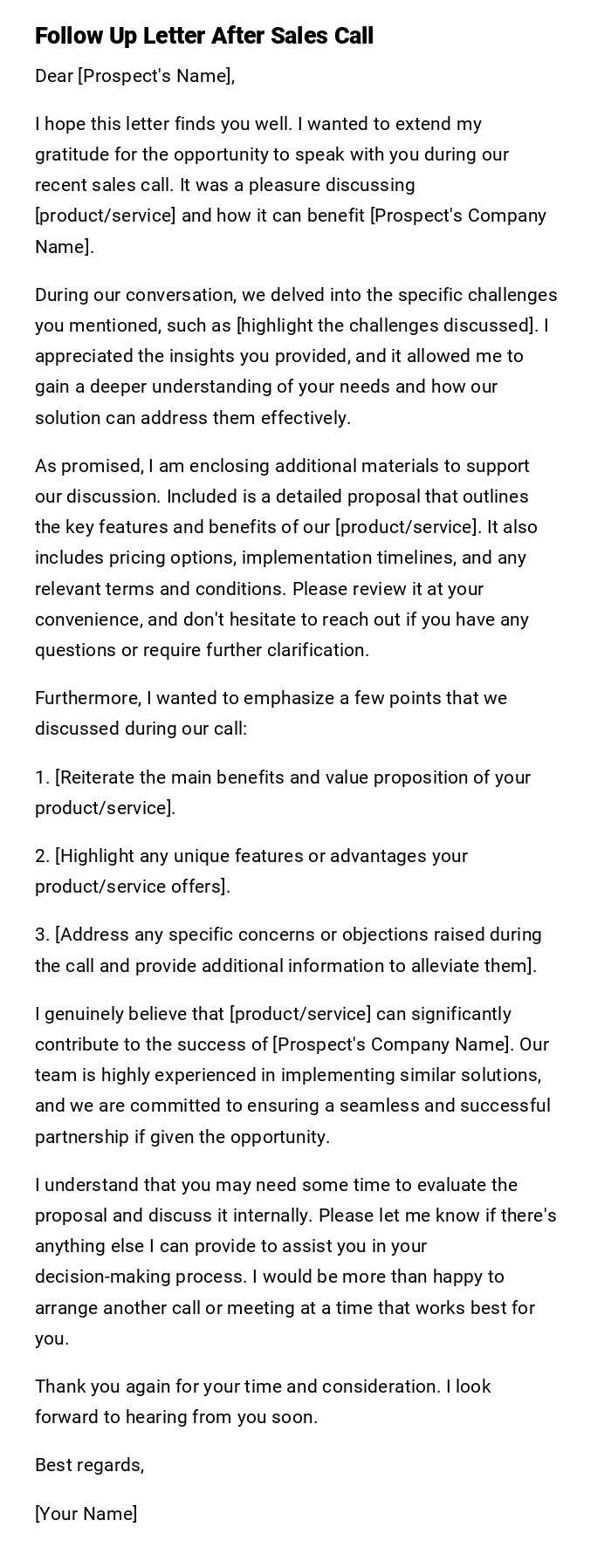
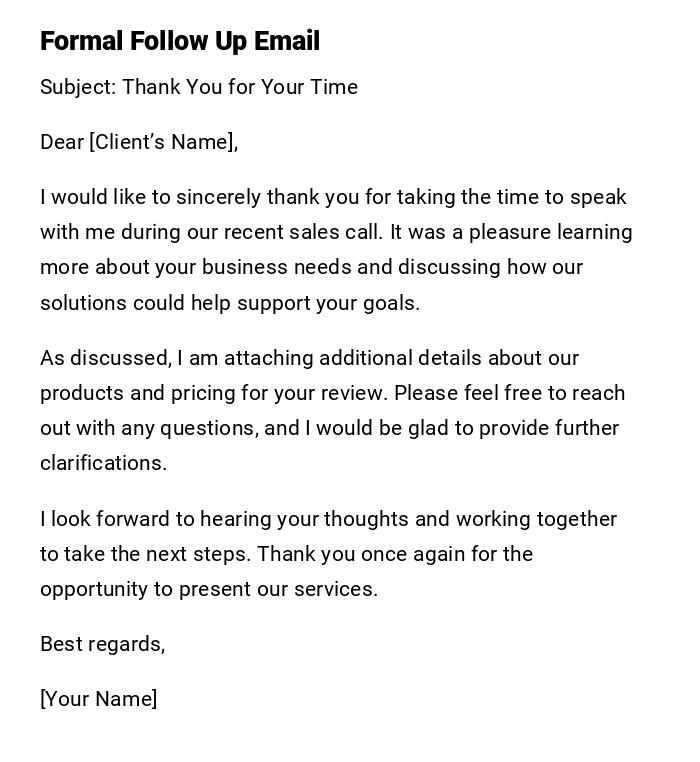
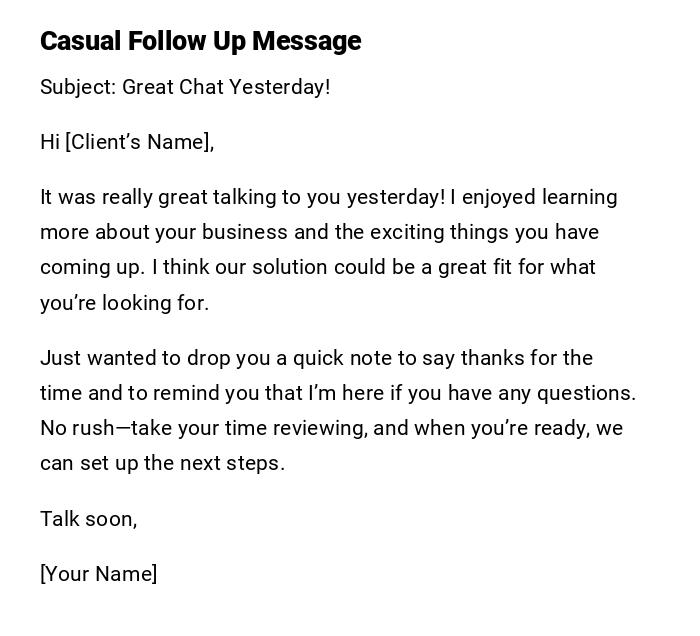
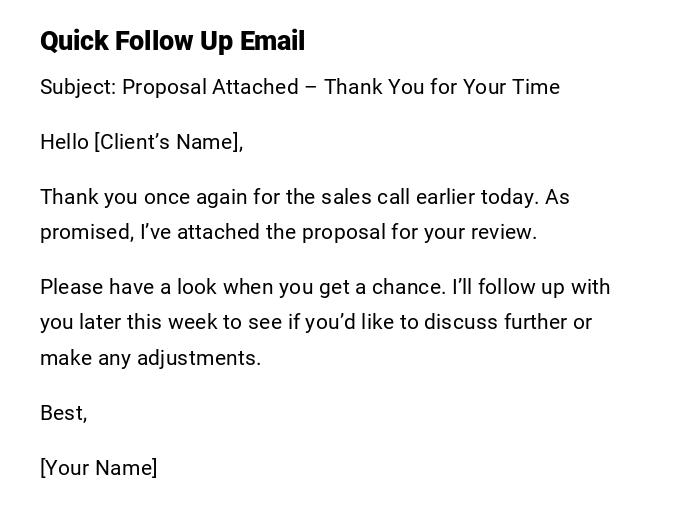
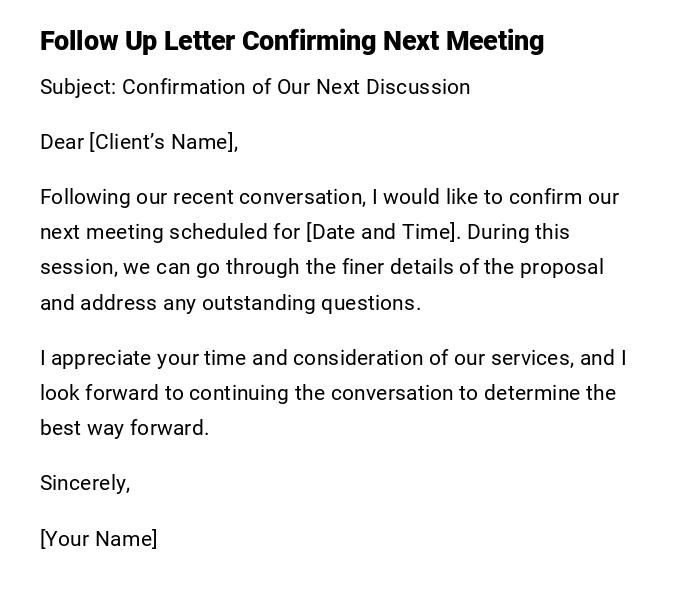
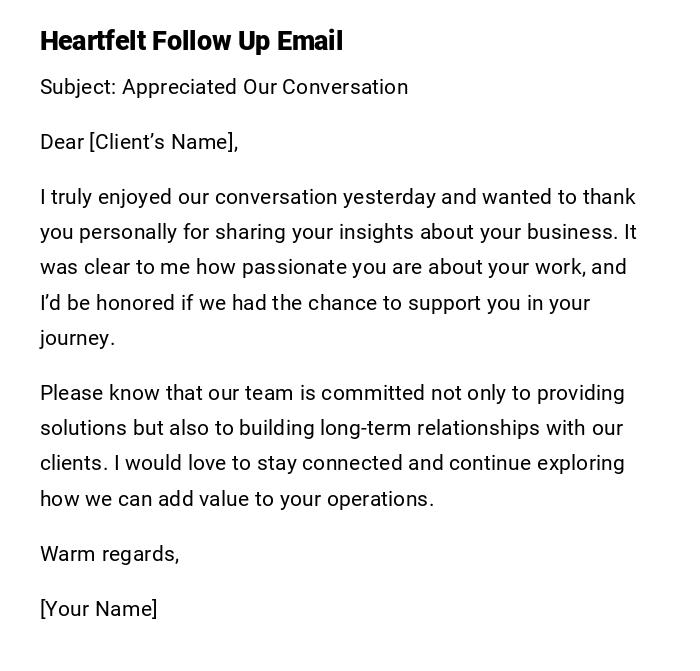
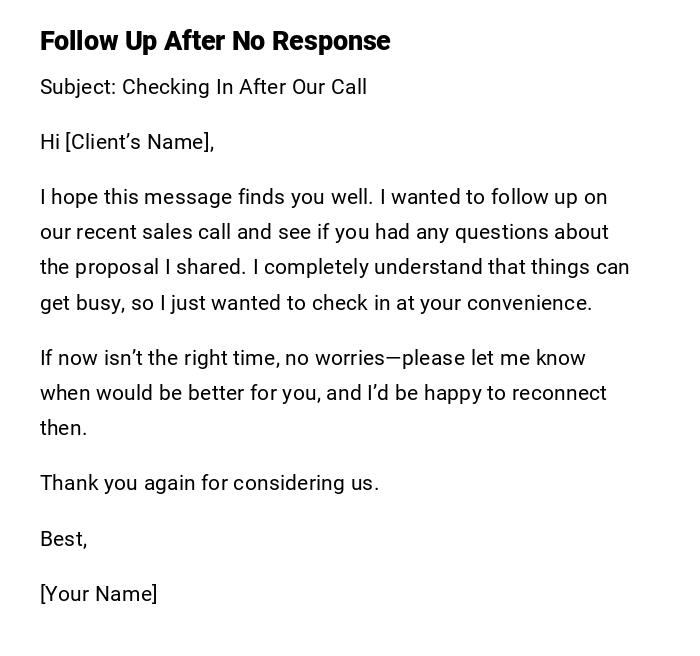
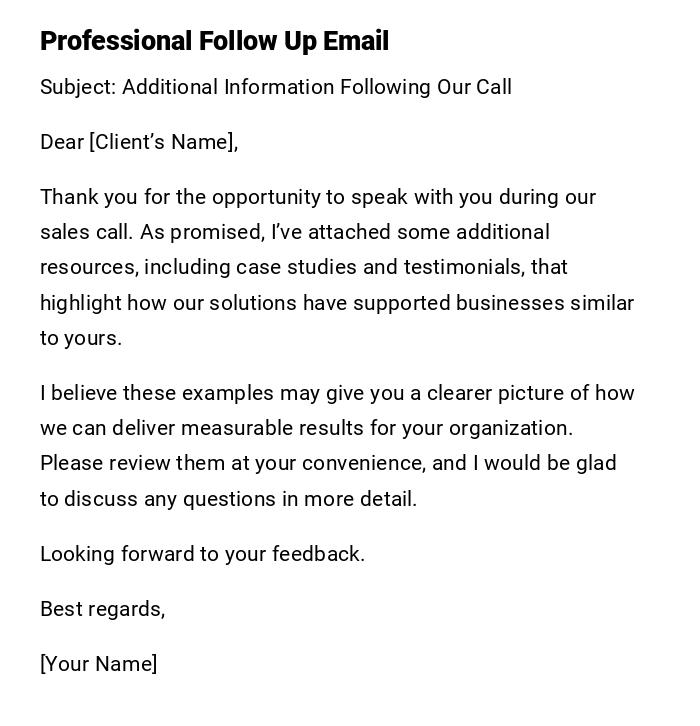

 Download Word Doc
Download Word Doc
 Download PDF
Download PDF